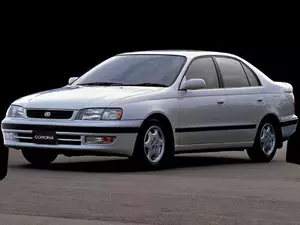
| Vehicle | Precise engine size | Difference from world average | Engine size to consumption ratio | Horsepower from 1 L | Engine size to 100 kg of weight |
|---|---|---|---|---|---|
| 1.6i 16V |
1.59 L (1587 cc) |
32.4% smaller | - | 66 hp from 1 L | 144 cc to 100 kg |
| 1.8 i 16V |
1.76 L (1762 cc) |
24.9% smaller | - | 65 hp from 1 L | 147 cc to 100 kg |
| 2.0 i 16V D-4 |
2 L (1998 cc) |
14.8% smaller | - | 73 hp from 1 L | 167 cc to 100 kg |
| Vehicle | 1.6i 16V |
|---|---|
| Precise engine size | 1.59 L (1587 cc) |
| Difference from world average | 32.4 smaller |
| Engine size to consumption ratio | - |
| Horsepower from 1 L | 66 hp from 1 L |
| Engine size to 100 kg of weight | 144 cc to 100 kg |
| Vehicle | 1.8 i 16V |
| Precise engine size | 1.76 L (1762 cc) |
| Difference from world average | 24.9 smaller |
| Engine size to consumption ratio | - |
| Horsepower from 1 L | 65 hp from 1 L |
| Engine size to 100 kg of weight | 147 cc to 100 kg |
| Vehicle | 2.0 i 16V D-4 |
| Precise engine size | 2 L (1998 cc) |
| Difference from world average | 14.8 smaller |
| Engine size to consumption ratio | - |
| Horsepower from 1 L | 73 hp from 1 L |
| Engine size to 100 kg of weight | 167 cc to 100 kg |

| Vehicle | Precise engine size | Difference from world average | Engine size to consumption ratio | Horsepower from 1 L | Engine size to 100 kg of weight |
|---|---|---|---|---|---|
| 1.8i |
1.79 L (1794 cc) |
23.5% smaller | - | 70 hp from 1 L | 150 cc to 100 kg |
| 2.0i |
2 L (1998 cc) |
14.8% smaller | - | 70 hp from 1 L | 167 cc to 100 kg |
| Vehicle | 1.8i |
|---|---|
| Precise engine size | 1.79 L (1794 cc) |
| Difference from world average | 23.5 smaller |
| Engine size to consumption ratio | - |
| Horsepower from 1 L | 70 hp from 1 L |
| Engine size to 100 kg of weight | 150 cc to 100 kg |
| Vehicle | 2.0i |
| Precise engine size | 2 L (1998 cc) |
| Difference from world average | 14.8 smaller |
| Engine size to consumption ratio | - |
| Horsepower from 1 L | 70 hp from 1 L |
| Engine size to 100 kg of weight | 167 cc to 100 kg |

| Vehicle | Precise engine size | Difference from world average | Engine size to consumption ratio | Horsepower from 1 L | Engine size to 100 kg of weight |
|---|---|---|---|---|---|
| 1.6i 16V EX |
1.59 L (1587 cc) |
32.4% smaller | 35 cc to 1 mpg | 72 hp from 1 L | 144 cc to 100 kg |
| 1.8i 16V EX |
1.84 L (1839 cc) |
21.6% smaller | 42 cc to 1 mpg | 68 hp from 1 L | 167 cc to 100 kg |
| 2.0 D 4WD EX |
1.97 L (1974 cc) |
15.9% smaller | - | 37 hp from 1 L | 152 cc to 100 kg |
| 2.0 D |
1.97 L (1974 cc) |
15.9% smaller | - | 37 hp from 1 L | 165 cc to 100 kg |
| 2.0 i 16V |
2 L (1998 cc) |
14.8% smaller | 62 cc to 1 mpg | 88 hp from 1 L | 167 cc to 100 kg |
| 2.0i 16V EX |
2 L (1998 cc) |
14.8% smaller | 54 cc to 1 mpg | 64 hp from 1 L | 154 cc to 100 kg |
| 2.0i 16V 4WS TR-R |
2 L (1998 cc) |
14.8% smaller | 51 cc to 1 mpg | 67 hp from 1 L | 167 cc to 100 kg |
| 2.0 i 16V TR-G |
2 L (1998 cc) |
14.8% smaller | 57 cc to 1 mpg | 90 hp from 1 L | 167 cc to 100 kg |
| Vehicle | 1.6i 16V EX |
|---|---|
| Precise engine size | 1.59 L (1587 cc) |
| Difference from world average | 32.4 smaller |
| Engine size to consumption ratio | 35 cc to 1 mpg |
| Horsepower from 1 L | 72 hp from 1 L |
| Engine size to 100 kg of weight | 144 cc to 100 kg |
| Vehicle | 1.8i 16V EX |
| Precise engine size | 1.84 L (1839 cc) |
| Difference from world average | 21.6 smaller |
| Engine size to consumption ratio | 42 cc to 1 mpg |
| Horsepower from 1 L | 68 hp from 1 L |
| Engine size to 100 kg of weight | 167 cc to 100 kg |
| Vehicle | 2.0 D 4WD EX |
| Precise engine size | 1.97 L (1974 cc) |
| Difference from world average | 15.9 smaller |
| Engine size to consumption ratio | - |
| Horsepower from 1 L | 37 hp from 1 L |
| Engine size to 100 kg of weight | 152 cc to 100 kg |
| Vehicle | 2.0 D |
| Precise engine size | 1.97 L (1974 cc) |
| Difference from world average | 15.9 smaller |
| Engine size to consumption ratio | - |
| Horsepower from 1 L | 37 hp from 1 L |
| Engine size to 100 kg of weight | 165 cc to 100 kg |
| Vehicle | 2.0 i 16V |
| Precise engine size | 2 L (1998 cc) |
| Difference from world average | 14.8 smaller |
| Engine size to consumption ratio | 62 cc to 1 mpg |
| Horsepower from 1 L | 88 hp from 1 L |
| Engine size to 100 kg of weight | 167 cc to 100 kg |
| Vehicle | 2.0i 16V EX |
| Precise engine size | 2 L (1998 cc) |
| Difference from world average | 14.8 smaller |
| Engine size to consumption ratio | 54 cc to 1 mpg |
| Horsepower from 1 L | 64 hp from 1 L |
| Engine size to 100 kg of weight | 154 cc to 100 kg |
| Vehicle | 2.0i 16V 4WS TR-R |
| Precise engine size | 2 L (1998 cc) |
| Difference from world average | 14.8 smaller |
| Engine size to consumption ratio | 51 cc to 1 mpg |
| Horsepower from 1 L | 67 hp from 1 L |
| Engine size to 100 kg of weight | 167 cc to 100 kg |
| Vehicle | 2.0 i 16V TR-G |
| Precise engine size | 2 L (1998 cc) |
| Difference from world average | 14.8 smaller |
| Engine size to consumption ratio | 57 cc to 1 mpg |
| Horsepower from 1 L | 90 hp from 1 L |
| Engine size to 100 kg of weight | 167 cc to 100 kg |

| Vehicle | Precise engine size | Difference from world average | Engine size to consumption ratio | Horsepower from 1 L | Engine size to 100 kg of weight |
|---|---|---|---|---|---|
| 2.0 i 16V |
2 L (1998 cc) |
14.8% smaller | 56 cc to 1 mpg | 67 hp from 1 L | 167 cc to 100 kg |
| 1.8 i 16V |
1.84 L (1839 cc) |
21.6% smaller | - | 68 hp from 1 L | 153 cc to 100 kg |
| Vehicle | 2.0 i 16V |
|---|---|
| Precise engine size | 2 L (1998 cc) |
| Difference from world average | 14.8 smaller |
| Engine size to consumption ratio | 56 cc to 1 mpg |
| Horsepower from 1 L | 67 hp from 1 L |
| Engine size to 100 kg of weight | 167 cc to 100 kg |
| Vehicle | 1.8 i 16V |
| Precise engine size | 1.84 L (1839 cc) |
| Difference from world average | 21.6 smaller |
| Engine size to consumption ratio | - |
| Horsepower from 1 L | 68 hp from 1 L |
| Engine size to 100 kg of weight | 153 cc to 100 kg |

| Vehicle | Precise engine size | Difference from world average | Engine size to consumption ratio | Horsepower from 1 L | Engine size to 100 kg of weight |
|---|---|---|---|---|---|
| 1.5 |
1.5 L (1497 cc) |
36.2% smaller | - | 60 hp from 1 L | - |
| Vehicle | 1.5 |
|---|---|
| Precise engine size | 1.5 L (1497 cc) |
| Difference from world average | 36.2 smaller |
| Engine size to consumption ratio | - |
| Horsepower from 1 L | 60 hp from 1 L |
| Engine size to 100 kg of weight | - |